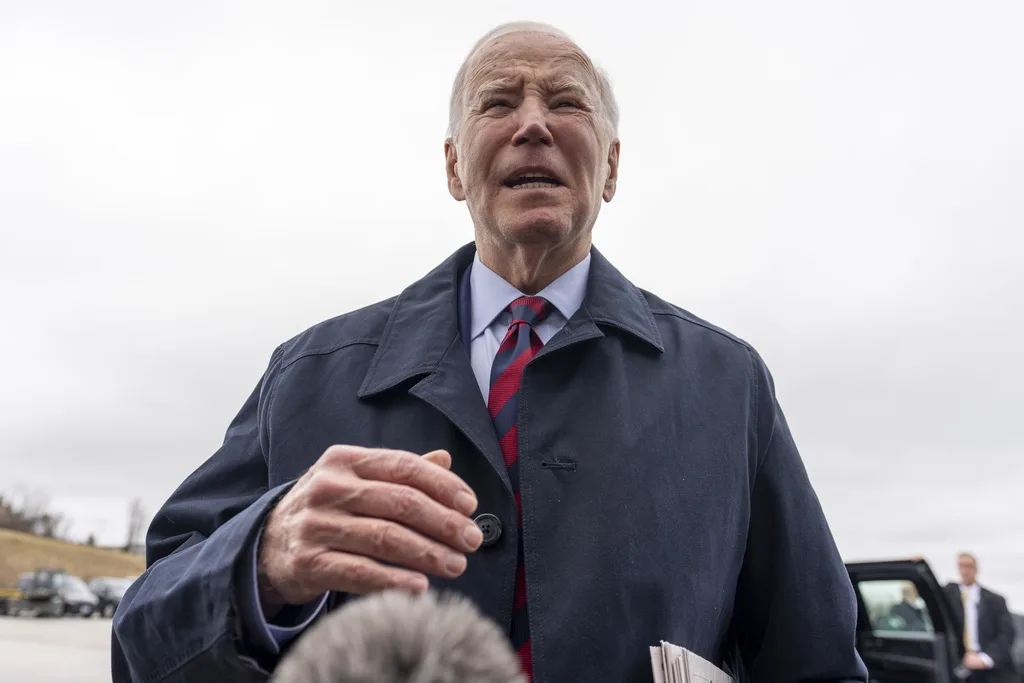
FILE - President Joe Biden delivers the State of the Union address to a joint session of Congress at the Capitol, on March 7, 2024, in Washington. (Shawn Thew/Pool Photo via AP, File)
Biden called for a mortgage relief credit that would give first-time homebuyers an annual tax credit of up to $5,000 a year for two years. He also endorsed legislation to build and renovate roughly 2 million homes and vowed to crack down on price-gouging landlords.
President Joe Biden prioritized lowering consumer costs in Thursday’s State of the Union address, announcing initiatives aimed at addressing issues ranging from high housing prices to credit card fees.
While inflation has moderated from a peak of 9.1% in 2022, high costs in areas like housing and groceries continue to affect American families.
Costs of living easily top the list of voter worries. According to a Gallup poll in February, some 30% of those surveyed said economic problems ranked as the most important problem facing the country.
Such concerns can frequently be tied to homeownership, which has become increasingly out of reach to many buyers — and particularly millennials — who have been locked out of the market due to high mortgage rates and a historically limited supply of affordable homes.
In 2023, the average price of a home in the United States stood at $492,300, compared to $384,000 five years prior. Likewise, the median homebuyer is now nearly 50-years-old, according to annual data from the National Association of Realtors.
In his address, Biden called on Congress to pass a mortgage relief credit that would give first-time homebuyers an annual tax credit of up to $5,000 a year for two years.
“I know the cost of housing is important to you,” he said. “If inflation keeps coming down, mortgage rates will come down as well. But I’m not waiting.”
National supply shortages of existing stock in the housing market brings intense pressure in addition to a scarcity of new units. Many homeowners admit reluctance to sell their homes and risk assuming mortgages at higher rates.
According to data from Freddie Mac for the week ending March 7, the average rate for a 30-year fixed-rate mortgage is 6.88%. Roughly 85% of individuals with mortgages have rates below 5%.
Biden called on Congress to advance legislation to build and renovate roughly 2 million homes to close the supply gap. The president also promised to eliminate title insurance fees for federally backed mortgages on certain refinances.
The administration estimated that doing so would save homeowners up to $1500, and an average of $750, with the lower upfront fees unlocking substantial savings.
¨For millions of renters, we’re cracking down on big landlords who break antitrust laws by price-fixing and driving up rents,¨ he said.
According to the Joint Center for Housing Studies at Harvard, rents have not only risen, but they have outpaced incomes over the last two decades.
David Dworkin, president and chief executive officer of the National Housing Conference and a former Treasury Department official, told The Washington Post that the plan was the ¨most consequential set of housing recommendations in a State of a Union in over 50 years.¨
“We have a huge hole this would make a big dent in,” Dworkin said. “The supply side is driving housing prices, and this is the most ambitious housing supply agenda in recent history.”
The American Land Title Association, which represents and lobbies for title insurance companies and agents, opposes Biden’s plan to waive the requirement for lender’s title insurance on certain refinances. The organization described the effort as “a purely political gesture offering a false promise of savings for homeowners while exposing consumers, lenders, and taxpayers to greater financial risk.”
Biden also addressed credit card junk fees, calling them the “hidden fees at the end of your bill that are there without your knowledge.”
Earlier in the week, the Consumer Financial Protection Bureau said it would cut credit card late fees from $32 to $8, a move which also faced criticism.
The American Bankers Association, an organization that lobbies for banks, said that rule ¨will not only reduce competition and increase the cost of credit, but will also result in more late payments, higher debt, lower credit scores and reduced credit access for those who need it most.¨
“The credit card companies don’t like it,” Biden said. “But I’m saving American families $20 billion a year with all of the junk fees I’m eliminating.”
He also discussed rules his administration proposed to make cable, travel, utilities, and online ticket sellers reveal total prices upfront.
Politics

Biden administration bans noncompete clauses for workers
The Federal Trade Commission (FTC) voted on Tuesday to ban noncompete agreements—those pesky clauses that employers often force their workers to...

Democratic shakeup in Virginia primaries for governor, lieutenant governor
Richmond Mayor Levar Stoney quit his bid for governor and jumped into the race to be the Democratic nominee for lieutenant governor. The race for...
Local News

The zodiac signs of 12 iconic women offer insight into their historic accomplishments
Zodiac signs can tell you a lot about someone’s personality. Whether they’re an earth, water, air, or fire sign, these 12 categories (which are...

Virginia verses: Celebrating 5 poetic icons for National Poetry Month
There’s no shortage of great writers when it comes to our commonwealth. From the haunting verses of Edgar Allan Poe, who found solace in Richmond's...




